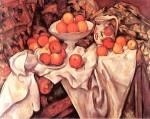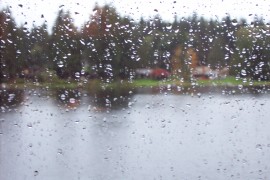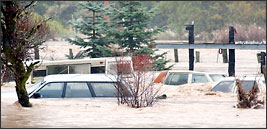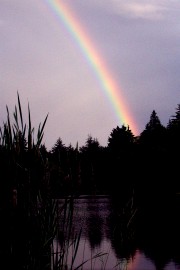Life at the Lake
a diary of living at a small lowland lakeWHAT IT'S LIKE

Early moonrise over Lake Ketchum
|
Archive Search |
| Links |
|
and s-integrator |

Paul Cezanne, "Apples and Biscuits," oil, c. 1880
224
People who are enthusiastic about Paul Cezanne and his still lives point to the bouquets of fruit he painted over his long career. One critic likened the above painting to a landscape, with the back of the table constituting the horizon, and one apple cleverly juttting up over it. The apples in the foreground seem randomly displayed, but that critic say it is not the case, and Cezanne thoughtfully placed them in what might seem casual groups, but there is a plan and the colors are bunched accordingly.
I sometimes think critics read into a picture whatever they want to be there, regardless. I know in the instance of my own photos and paintings, I can give a smart-ass presentation of such interpretations which occur to me for the first time when there is an audience present.
In other words, no such deliberation takes place, but nonetheless those elements are present, if only in the eye of the behonder. C'est moi.
- - Comments ()
...

Paul Cezanne, "Apples and Oranges"
223
Poet Stanley Zunitz is near the century mark, but according to the New Yorker is an active gardener near Cape Cod and—much more importantly—still writing his distinctive poetry.
Back when his Selected Poems were published (in 1958, when I was still a graduate lit student), he published the poem "Postscript."
From it the following lines:
"A man can starve upon the golden-sweet
Impossible apples of Cézanne; a man
Can eagerly consult a woman's head
(Picasso's), but her slow and stupid eyes
Drink light in vegetative apathy."
Interesting juxtaposition. Of course apples are a fruit, not a vegetable, but Picasso's women have a dull, vegetative look, while Cezanne's apples are "impossible," and one can starve looking upon them. So neither is sustaining? I doubt whether Kunitz truly meant what he stated so well, in the style of the old Metaphysical Poets of that period.
Both painters are sustaining. As for the "impossible" apples of Cézanne, I see what Kunitz is getting at, but they are highly possible, in my opinion, and I have found this painting, and others of Cezanne's, not only sustaining but inspiring, over so many decades.
- - Comments ()
...

The lake through a rain-splattered window
222
I am beginning to think that most people live lives of barely contained fury. This is a far cry from living lives of quiet desperation, which phrase survives from Thoreau's day.
The difference is huge. One is softly contained, while the other is in danger of explosion. No, I haven't just read the morning newspaper and come across again a man (or perhaps a woman) killing an ex-lover, or abusing a child, or committing some senseless act of violence against a stranger.
Instead, I see it all around me, even here at the placid lake, which is calm this morning, though the ground is drenched and the nearby Skagit is slowly receding from its record flood—record for this century, anyway, and well back a decade into the last.
Why are we all so angry? My neighbors were at each other's throats a week or so ago. The same small, ranging, yapping, shatting dogs that have annoyed me for several years (my own dogs, you understand, are wonderful and well-behaved always) have so inflamed the new neighbor two doors to the West that they have threatened our mutual next door neighbors with the dogs with construction of a tall fence.
Not a four-foot fence, such as we built out in front, by the road, to contain our own big, black Labs, but a much taller fence that would run the length of the lot to the lake—some 300 feet.
The threatened fence was cleared with the county planning and licensing people, who told the new neighbor, Jim, that ordinarily a fence goes no more than six or eight feet high.
"No," said Jim, "I want to know the tallest possible, permissible fence." The counter clerk looked up commercial listings and found that one very tall fence was once issued a permit for a factory, I guess it was.
"How high? asked the still-angry Jim.
"Eighteen feet."
And that was the fence height Jim threatened our mutual neighbors with.
"A bluff," I said laughing, when Jim told me about it, out in the rain, gathering my morning newspaper, the other morning early.
The look he gave me contained that slightly suppressed fury that I mentioned above, and said it was no bluff.
Or else it was a bluff again, this time aimed at me. Such a fence would cost thousands and be permanently unsightly.
So our mutual neighbors hired a firm to install what is called an "Invisible Fence." It is a wire both below ground and above that completely surrounds their property. It carries an electrical current and the two small yapping snarling dogs now wear special collars that, well, zap the dogs whenever they come up to it.
It slightly fries them. A man from Invisible Fence "trains" the dogs, along with their female owner, how the dogs are not to cross the invisible line. (Ah, were we all so trained in our social relationships!) Time after time the dogs get zapped. This hurts them, shocks them into obedient submission. They learn quickly.
Yes, I have already thought that my neighbors (two adults, two snotty children) should be forced to wear such collars, at least for a day.
No, for week; no, a month. Hell, for the rest of their natural lives.
You see, I am not immune from furious rage myself, and know quite a bit about it.
- - Comments ()
...

Skagit-river town of Hamilton under water
How nice to live on a tame lake and not on a river!
This morning on the lake, a flock of lesser scaups—the first of this species sighted this fall and a sure sign that winter is approaching. There will be more scaups soon, and they will help decimate the population of three-inch largemouth bass that will be detrimental to the lake and its food supply. Thus do the seasons bring a needed balance (read: attrition) to the lake's ecosystem.
A couple of days ago the Pacific Northwest received a record 4.7 inches of rain in a twenty-four hour period. Now this sometimes happens in the coastal rainforest near Forks, but to happen in the Seattle area is unheard of. It beats the old record by a couple of true inches. And now all the local rivers are in flood stage. One by one they are dropping back into their banks.
The Mighty Skagit crested yesterday afternoon at nine feet over its banks. Of course it spreads out, over town and fields, so that it is not a true vertical measurement. In Mount Vernon, on the river, school was dismissed and many kids participated in a sandbagging effort to save the old, downtown business area from water damage.
Such an effort can only be partly successful. There was much flooding and outskirt stretches of the small city are still under water. The settlement (not quite a true town in size) of Hamilton was underwater to a depth of about four feet. Needless to say, homes were evacuated all along the river.
- - Comments ()
...

Two Canada geese pose for the camera
220
They are beautiful birds, large and plentiful. And they visit the lake with alarming regularity. For the past several years I've heard them honking in the night and, in the morning, sighted them floating on the lake in a, well, gaggle, I guess it is.
They always number 27. I don't know why. There must be natural attritition; in the spring goslings are born and attended to by extended families of look-alike adults. These must be uncles and aunts, in addition to normal goose parents, plus others that are drawn to the goose family through some kind of species bonding.
Twenty-seven. I count them frequently, though I know what the count will be. Twenty-seven.
One morning last week I saw two flocks. The smaller I knew (with a sinking sense of inevitability) that it would predictably number. The second, parked only a hundred feet away from the first, was a tad larger. I counted them quickly, then counted them again.
Thirty-eight. Where had they come from? And where would they go. I quickly totaled my count. Sixty-five. I looked for signs of interrelationships between the two floating, semi-stationary flocks, but could discern none.
They floated awhile, then one flock left, with a noisy flutter and series of squawks. It was less than a minute before the second (my original ) flock departed.
For most of a long afternoon the lake was bereft of geese. At dusk, the same story. But the next morning, forewarned by honking in the night (it wasn't cars) I fully expected to see bobbing on the lake the original flock of Canada geese.
I wasn't disappointed. And I didn't bother to count them.
- - Comments ()
...

After the storm often comes a rainbow over the lake
219
Hello again. We've been gone from the Web, but not from the lake, for four days now. We've been told it could happen anytime, a hard-drive crash, but never believed it. Sure, it happens to other people, but never to us.
My son, the computer whiz, spent about ten hours (and two meals) trying to repair a faulty file or two on my HD in Windows XP that caused it to slow to a crawl from day to day, and then finally not to crawl at all on Wednesday past.
Meanwhile a series of Pineapple Express weather fronts moved in, bringing in wind and bringing down trees. Something austerely impressive about a huge, sixty-year-old Western hemlock lying on the ground, where it had crashed (like a hard drive) to the ground, with owners and friends gathered round for its dismemberment. (Tree, not hard drive.)
Today, just rain and daylight darkness. Lake still abysmally low, though much rain has recently fallen, ending the five-month drought.
The winds are temporarily quiet. Yankees lost last night in the first game of the World Series, in another nail-biter. But only if you like baseball and biting the ends of your fingers.
The latter an indoor sport I have up decades ago, about the same time I acquired bifocals and could literally see the ugly ends of my fingers.
More anon, if the old son-repaired HD holds up a little bit longer.
- - Comments ()
...